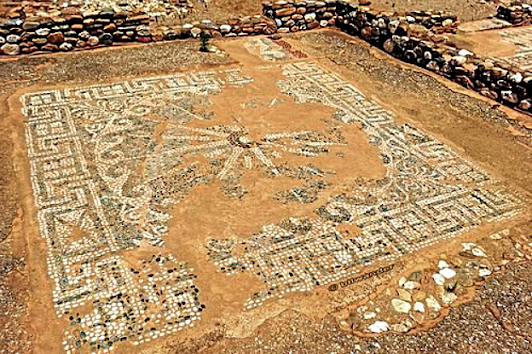A Mycenaean woman depicted on a fresco at Mycenae on mainland Greece.
© YANN FORGET/WIKIMEDIA COMMONS
Ever since
the days of Homer, Greeks have long idealized their Mycenaean "ancestors"
in epic poems and classic tragedies that glorify the exploits of Odysseus, King
Agamemnon, and other heroes who went in and out of favor with the Greek gods.
Although these Mycenaeans were fictitious, scholars have debated whether
today's Greeks descend from the actual Mycenaeans, who created a famous
civilization that dominated mainland Greece and the Aegean Sea from about 1600
B.C.E. to 1200 B.C.E., or whether the ancient Mycenaeans simply vanished from
the region.
Now,
ancient DNA suggests that living Greeks are indeed the descendants of
Mycenaeans, with only a small proportion of DNA from later migrations to
Greece. And the Mycenaeans themselves were closely related to the earlier
Minoans, the study reveals, another great civilization that flourished on the
island of Crete from 2600 B.C.E. to 1400 B.C.E. (named for the mythical King
Minos).
The Lion Gate was the main entrance to the Bronze Age citadel of Mycenae, the center of the Mycenaean civilization.
The ancient DNA comes from the teeth of 19 people, including 10 Minoans from Crete dating to 2900 B.C.E. to 1700 BCE, four Mycenaeans from the archaeological site at Mycenae and other cemeteries on the Greek mainland dating from 1700 B.C.E. to 1200 B.C.E., and five people from other early farming or Bronze Age (5400 B.C.E. to 1340 B.C.E.) cultures in Greece and Turkey. By comparing 1.2 million letters of genetic code across these genomes to those of 334 other ancient people from around the world and 30 modern Greeks, the researchers were able to plot how the individuals were related to each other.
The ancientMycenaeans and Minoans were most closely related to each other, and they both
got three-quarters of their DNA from early farmers who lived in Greece and
southwestern Anatolia, which is now part of Turkey, the team reports today in
Nature. Both cultures additionally inherited DNA from people from the eastern
Caucasus, near modern-day Iran, suggesting an early migration of people from
the east after the early farmers settled there but before Mycenaeans split from
Minoans.
The
Mycenaeans did have an important difference: They had some DNA—4% to 16%—from
northern ancestors who came from Eastern Europe or Siberia. This suggests that
a second wave of people from the Eurasian steppe came to mainland Greece by way
of Eastern Europe or Armenia, but didn't reach Crete, says Iosif Lazaridis, a
population geneticist at Harvard University who co-led the study.
This dancing Minoan woman from a fresco at Knossos, Crete (1600–1450 B.C.E.), resembles the Mycenaean women (above). WOLFGANG SAUBER/WIKIMEDIA COMMONS
Not surprisingly, the Minoans and Mycenaeans looked alike, both carrying genes for brown hair and brown eyes. Artists in both cultures painted dark-haired, dark-eyed people on frescoes and pottery who resemble each other, although the two cultures spoke and wrote different languages. The Mycenaeans were more militaristic, with art replete with spears and images of war, whereas Minoan art showed few signs of warfare, Lazaridis says. Because the Minoans script used hieroglyphics, some archaeologists thought they were partly Egyptian, which turns out to be false.
When the
researchers compared the DNA of modern Greeks to that of ancient Mycenaeans,
they found a lot of genetic overlap. Modern Greeks share similar proportions of
DNA from the same ancestral sources as Mycenaeans, although they have inherited
a little less DNA from ancient Anatolian farmers and a bit more DNA from later
migrations to Greece.
The
continuity between the Mycenaeans and living people is "particularly
striking given that the Aegean has been a crossroads of civilizations for
thousands of years," says co-author George Stamatoyannopoulos of the
University of Washington in Seattle. This suggests that the major components of
the Greeks' ancestry were already in place in the Bronze Age, after the
migration of the earliest farmers from Anatolia set the template for the
genetic makeup of Greeks and, in fact, most Europeans. "The spread of
farming populations was the decisive moment when the major elements of the
Greek population were already provided," says archaeologist Colin Renfrew
of the University of Cambridge in the United Kingdom, who was not involved in
the work.
The results
also show it is possible to get ancient DNA from the hot, dry landscape of the
eastern Mediterranean, Renfrew says. He and others now have hope for getting
DNA from groups such as the mysterious Hittites who came to ancient Anatolia
sometime before 2000 B.C.E. and who may have been the source of Caucasian
ancestry in Mycenaeans and early Indo-European languages in the region.
Archaeologist Kristian Kristiansen of the University of Gothenburg in Sweden,
who was not involved in the work, agrees. "The results have now opened up
the next chapter in the genetic history of western Eurasia—that of the Bronze
Age Mediterranean."


































